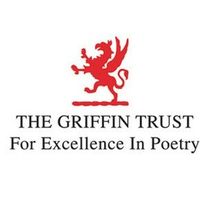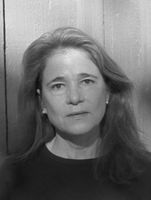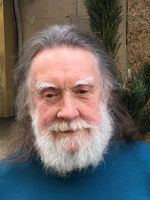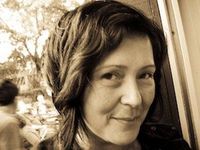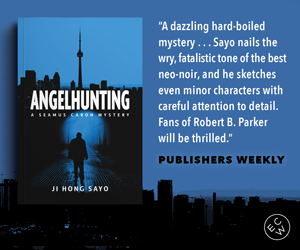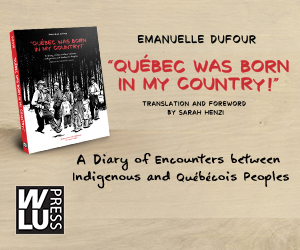The 2017 Griffin Prize nominees on Poetry & Favourite Reads
The Griffin Poetry Prize counts amongst its past winners some of the most lauded, beloved, and respected names in poetry. Icons like Anne Carson, Paul Muldoon, and P.K. Page are just a few of those who have been honoured with the $75,000 award. This year, six poets and one poet-translator team have been nominated for the two prizes (one Canadian, one international): Jordan Abel, Hoa Nguyen, and Sandra Ridley, nominated for the Canadian prize; and Abdellatif Laâbi (with translator Donald Nicholson-Smith), Jane Mead, Alice Oswold, and Denise Riley, nominated for the International prize.
Today we're excited to present a conversation with the finalists, including translator Donald Nicholson-Smith, responding in place of Abdellatif Laâbi.
Each finalist for both the international and Canadian prizes receives $10,000 in recognition of the literary excellence of their work, with the two winners receiving an additional $65,000. This year's winners will be announced at an event in Toronto on June 8, 2017, after a decision is reached by judges Sue Goyette (Canada), Joan Naviyuk Kane (USA), and George Szirtes (UK).
On June 7, the nominees will read from their shortlisted works in Toronto. You can purchase tickets to the event through the Royal Conservatory's website here (tickets start at $20.00).
In our conversation below, Jordan Abel tells us about working with 10,000 pages of source text, Hoa Nguyen shares an amazing "Question Manifesto", and we hear from a disorganized Capricorn.
______________________________________________________________________
Open Book:
Tell us about your nominated collection (or the collection you translated) and how the project originated for you.
Jordan Abel:
Injun, like my other projects, began with reading. As a Nisga’a writer who primarily uses the tools/methodologies of conceptual poetry to comment on Indigenous issues, the source text is perhaps the most important initial choice. For this book, I ended up working with 91 public domain western novels (all freely available on Project Gutenberg). As an Indigenous person, westerns make me uncomfortable. Not only are Indigenous peoples usually dehumanized and slaughtered in this genre. But so many people are also deeply nostalgic for the western. Often unapologetically so. Injun, then, begins by investigating and problematizing that colonial nostalgia.
Jane Mead:
World of Made and Unmade is a book-length poem written shortly after a surreal period of caring for my mother as she died. I worked from notes and fragments, but the poem itself came together quite quickly during a Lannan residency in Marfa, Texas. I did not set out to write a long poem, but once I got into it, it seemed to absorb material and dimension of its own volition.
Hoa Nguyen:
I arrive at poems out of an engagement with phenomological circumstance—writing out of the “now” toward the personal, historical, and the cosmological. I began writing Violet Energy Ingots in the fall of 2011 and wrote towards the manuscript over the next four and a half years. I tend to write slowly and in response to my environments of time and place in its intersections.
Your CanLit News
Subscribe to Open Book’s newsletter to get local book events, literary content, writing tips, and more in your inbox
Donald Nicholson-Smith:
Jill Schoolman of Archipelago Books, a leading U.S publisher of translations, had been trying for some time to find a project that would suit me when she brought me Abdellatif’s Laâbi manuscript. I say manuscript because this selection of his poems, spanning his entire career, was made by himself but not published as a French book. Jill felt that this was a good match for me. To begin with I was not sure. But she was right!
Alice Oswald:
Falling Awake is a book of outbursts, which came into being alongside various longer poems. It mostly took shape around the fields and walks where I live in South Devon - which is not to say that the poems are about nature (all kinds of unnatural dreams and nightmares inhabit the country-side). They are just studies of matter with immaterial patterns moving through them.
Sandra Ridley:
Silvija was pieced together from fragmentary, isolated long poems that had been written over five years or so, each with seemingly disparate purposes and sources. A few were written in response to art created by Michèle Provost (http://www.micheleprovost.ca) and Pedro Isztin (http://isztinfoto.com/study-of-structure-and-form/).
These elegies of sorts merged into a larger sequence in the middle of a sleepless night. That night gave me a revelation of sorts. Maybe clarity? I saw how the separate parts could work together. They spoke to each other. All sourced from the same kindred impulse or origin; there was consanguinity. The poem “In Praise of the Healer” became a tether, as it had to, by weaving between the others. I consider it to be a bloodline or a life sustaining breath from first gasp to last. If there’s a central, sustaining poem in Silvija, I’d like to think that’s it.
Silvija Barons is the name of one of my closest friends who died of a brain tumor in 2011. She was a polylingual polyglot, a Renaissance woman, once a head surgical nurse, a WW2 DP camp survivor, and a lover of Wagner’s Der Ring des Nibelungen. She lived her summers at the lake I write at. Over a twenty-year period, Silvija and I grew close. She would invite me over to her A-Frame to tutor me on The Ring, playing and replaying it on vinyl in the background. We’d talk about Valkyries and our companionship kept me writing. I wrote for her and she was my first audience. The best dedication I could give her, to remember her and her life, was to name the book Silvija. The first page reads:
L. Silva. A wood, forest, woodland; in poetry, a piece composed,
as it were, at a start, in a kind of Rapture; a title for a collection of
pieces, esp. of poems.
Sylvan, Silvana, Silvanæ. A being of the woods; a deity or spirit
of the woods; the Goddess of the woods; proper name of a divinity
of fields and forests; an imaginary being supposed to haunt woods
and groves.
Denise Riley:
It’s mostly recent work, which originated as reflections on living among the commonest losses, including loss by death and loss by abandonment.
OB:
Are there images, themes, or questions you notice recurring your work or the work you are translating? If so, what are they?
JA:
Yes, so the source text for Injun is comprised of 91 western novels (over 10,000 pages of source text). However, Injun itself was built out of the 509 sentences that contain the word “Injun” in that 10,000 page source text. The book is about recurring, shifting, and slidin
g contexts that surround the word “Injun.” Another way to say that is that Injun is book about focusing in on context in order to investigate the textual contours of racism and the representation of Indigenous peoples. The contexts surrounding the word “Injun” necessarily repeat and recur.
JM:
I imagine there are, but I’m not very good at thinking about it.
HN:
In January of 2016, I participated in a program considering the intersection between writing and the political or public world. The questions developed there (part of a “Question Manifesto”) are ones that continue to be relevant to and recurring in my work:
How do we counter the North American tradition of forgetting?
How does forgetting produce invisibility?
How do you find the things that are invisible to you?
How do we write against the production of unseeing?
How do we remember grief?
Does it possess stories?
How do we acknowledge feminized labor?
DNS:
Although Laâbi’s book includes poems from what might be considered three somewhat separate stages in his career - his early work, including that associated with the journal he edited during the sixties, Souffles; his prison poems from the seventies; and his more recent work since his establishment in France in semi-voluntary exile in 1985 – it is nevertheless clear to the reader that there is really only one voice here. That voice of Laâbi’s is a profoundly humanist one, and his themes remain constant: hope for the future of mankind and the corresponding temptation of despair. He is also a genuine love poet – but the twin themes of love and political struggle are ever present and ever inseparable.
AO:
Everything falls in these poems - as if they carried the momentum of my previous book, Memorial, which is full of the thud of falling bodies. I’m interested in what it means to be alive - to have weights and outlines which are all the time collapsing earthwards.
SR:
The forest, the shadows, the hidden, the silent, the light, and our short lives with our loves and losses. And integral to those recurrences, also mercy and resistance, concealment and revelation, the lush and the traumatic, the open, the constrained, the transcended, and the body—always the body.
I’ve been thinking about what Edmond Jabès wrote: “Every book… the lacing of risk… Every work cancels the dark. Every work is a hymn from the other side of memory to a memory that is spellbound.”
DR:
My writing sometimes seems to be straining to hear something in the air that it can’t ever be sure of catching. I think I repeat myself far more than I’m aware of. [One use of giving a public reading is that all of a sudden you can hear, too late, your own repetitiousness.]
OB:
If you were to recommend just one Canadian poem (or poetry collection) to readers right now, what would it be and why?
JA:
ةيلمع Operación Opération Operation 行 动 Oперация by Moez Surani.
Operation is an astounding book (and long poem) that really digs into how violence is represented, misrepresented, transformed, and hidden. If you haven’t read it already, I would highly recommend it. If you’ve already read it… maybe read it again?
JM:
THE BIRD
Fluffed and still as snow, the white
bird lay in a crumple of death
far, far below the flock which, sailing, heard
but did not feel, the shot.
And the lonely boy suddenly grew afraid
as from his feet the doubt took wing and rose
up from the feathered hurt like a black bird
darkening the whole sky in the empty land.
– F.R. Scott
Tightly constructed, precisely mirrored, this is a poem that might nonetheless seem simplistic or sentimental to today’s reader. It strikes me, rather, as a simply rendered description of a basic human emotion.
Today, its relevance may be as much in its resonance as metaphor as in its description of human impulse and regret; With the subject of the human relationship to the environment so much on everybody’s mind, it is hard not to hear those concerns echoed in the poem. Dwelling too long in that dimension diminishes the poem though. If one requires of this poem more than the ample work it does, then, yes – it may become sentimental.
I love this poem.
HN:
I would recommend The Accident of Being Lost by Leanne Betasamosake Simpson (Anansi Press 2017). A collection of short stories interspersed with poems/song lyrics, it is funny, fierce, and brings responses to those important questions I listed earlier as she deftly and genre-defyingly dismantles monoliths.
DNS:
I suppose I would have to say the entire oeuvre of Leonard Cohen. This might seem obvious (or not), but I feel as though this man’s verses have accompanied me my whole life long. Likely a “generational” answer!
AO:
I always recommend Anne Carson’s books, because they redefine what poetry can be. She seems to be allowing the essay form to roam around in the poem form and because her mind is scalpel-sharp this works brilliantly. I don’t know how to describe her latest collection, Float - a folder of indefinable writings - but I couldn’t more highly recommend it.
SR:
Considering books published as I write this, Christine McNair’s Charm. Her work is unyielding. Full of precision, elegance and power, an attentive intensity thrives in these poems. With her beguiling conservator’s eye, McNair tussles with materia prima and prima obscura; an orchid is never an orchid. She’s fearless in her examination of how impermanent objects are treated—of how we ourselves are objects. What lingers is a provocative sensuality, preserved from intimacies, inherent vices, destructive influences, harms and decay. Charm is stunning and alchemical.
DR:
I could mention several, but since you ask for just one: Lisa Robertson’s 3 Summers (Coach House Books, 2016) which is variously dreamy, comic, and graceful.
OB:
Tell us what a typical day of writing or translating looks like for you.
JA:
A typical day for me usually doesn’t involve any writing. I tend not to have a daily routine. When I’m feeling really creative, I’ll typically spend a few weeks or a few months doing a lot of creative work. I may work on writing all day or just for a few hours. But it’ll be an every day thing for that time period. On a good year, I’ll have a few prolonged creative stretches. That usually means that most of the time I’m not doing any creative work. And/or most of the time I’m just living life, answering emails, etc.
JM:
I don’t really have one. I try to give myself as much contemplative time as possible in my day-to-day life, and scribble. I try to stay alert to the world, and scribble. I try to maintain an active interior life, and to listen. I read things that will help me stay with language that is nuanced in its music. Staying open to the poems is a matter of many small habits I fold into my daily life. Sometimes those scribbles turn out to be almost complete poems. To recognize and work with them, I need to remove myself from my daily life and really sit with silence. It takes me at least a few days to get into that place, and if I can get away for six consecutive weeks a year, I can accomplish a lot from my notes and from whatever originates in that quiet. Depending on how you look at it, then, I am writing all the time, or six weeks a year.
HN:
I lead a private poetics workshop (out of my living room and in cyberspace). My poetic engagement—my writing and reading practice—is intimately linked to these workshops. Which means that the bulk of my writing happens in a literal and virtual living room and in the company of poets and poetry. I spend an hour closely reading 40 to 50 pages of poetry aloud and then write in response to this engagement for another hour.
Sun Ra once said, “Art does not begin with imitation, but with discipline.” This is my discipline; it works for me because it also gathers a community of poets together to critically encounter a large body of work as we perform, share, and reflect on our writing practice.
DNS:
Despite being a Capricorn, I am highly disorganized. Rituals are not my thing at all (nor is astrology!). All the same, every translator has to be a little bit obsessive-compulsive. As to my work habits, here is one: unlike many of my colleagues these days, I prefer to rely on printed dictionaries rather than virtual resources. And I keep my dictionaries as far from my desk as possible, which makes me get up and stretch my legs every time I need to look something up (which is, I might add, a very frequent occurrence!).
AO:
It’s hard to describe a writing day. I love to write for four or five hours at a stretch but I’m grateful for the interesting things that interrupt me.
SR:
Most of the time, it involves not writing! The rare day is a dock day—lying long in the sun reading books and daydreaming. The work of others nourishes me and I read from a spectrum, and salvage strange words, which I compile into long lists, like a collection of amputated limbs. Eventually the words begin to speak to each other and a kind of Frankensteinian poem forms.
DR:
It looks like a frayed charcoal-grey tangle.
___________________________________________________
For more information about The Griffin Poetry Prize, please visit their website
